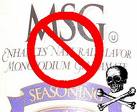
|
What's In That?
How Food Affects Our Behavior
by Alice Osborne
 Food additives and poor diet could help explain poor school performance, criminal behavior, alcoholism, and the growing numbers of Alzheimer's patients.
According to Dr. Russell Blaylock, high sugar content and starchy carbohydrates lead to excessive insulin release, which in turn leads to falling blood sugar levels, or hypoglycemia. Hypoglycemia causes the brain to secrete glutamate in levels that can cause agitation, depression, anger, anxiety, panic attacks and an increase in suicide risk.
The glutamate that causes this is identical to the flavor-enhancing monosodium glutamate (MSG) and its chemical cousins, which are found in thousands of food products, further exacerbating the problem.
Repeated hypoglycemic episodes increase the risk of neurodegenerative diseases, such as Alzheimer's disease, Parkinson's and ALS (Lou Gehrig's). In children, hypoglycemia often leads to hyperactivity. In both children and adults, it can cause violent and aggressive behavior. In older people, there can be mental confusion.
An anti-hypoglycemic diet would consist of lean meat and lots of fresh vegetables. Another key is limiting sugars and starches. Now let’s take a close look at the bitter impact of added MSG:
 MSG is used in countless foods in supermarkets, local restaurants, school cafeterias, and more. Everything from soup to crackers to meats may contain it because MSG, as dangerous as it is, makes food taste good and it is dirt cheap, just like sugar.
 There are a couple of main reasons why MSG is one of the worst food additives on the market. First, as Dr. Blaylock explains in his book Excitotoxins: The Taste that Kills, MSG is an excitotoxin, which means that it acts as a poison that overexcites your cells to the point of serious damage. MSG is non-discriminatory in its destructive path and can cause serious side effects throughout your bodily systems, including:
Cardiac
Circulatory
Gastrointestinal
Muscular
Neurological
Visual
Respiratory
Urological/genital
Skin
Other studies have confirmed that early exposure to MSG and other excitotoxins can destroy neurons in a crucial part of your brain, which can lead to gross obesity.
The second part of the equation is that MSG can be literally hidden in food labels, under names like broth, casein, hydrolyzed, autolyzed, natural flavors, and more, making it extremely difficult to identify.
The MSG Myth Website has done a good job trying to uncover the many hidden references that MSG can hide beneath.
 Incredibly, even infant formulas and baby food contain this poison, even though babies and infants, who are four times more sensitive than adults to the toxic effects of this chemical, are the most at risk. Incredibly, even infant formulas and baby food contain this poison, even though babies and infants, who are four times more sensitive than adults to the toxic effects of this chemical, are the most at risk.
In the 1970’s, food processors "voluntarily" took processed free glutamic acid (MSG) out of baby food. But that didn’t mean it was entirely removed. It was merely hidden deeper.
According to Dr. Blaylock’s Wellness Report, a 1995 review of MSG toxicity by the Federation of American Societies for Experimental Biology (FASEB) concluded that infant formula contained a dose of glutamate (the toxic ingredient in MSG) in the form of caseinate (cow’s milk protein) that can produce the very same brain injury seen in experimental animals.
MSG also finds its way into baby food in the form of fertilizers called "Omega Protein Refined/Hydrolyzed Fish Emulsion" or "Steam Hydrolyzed Feather Meal," both of which contain hydrolyzed proteins.
 The use of MSG in food manufacturing and processing is so pervasive, they’ve even found a way to use it on fresh produce. A product called AuxiGro WP Plant Metabolic Primer (AuxiGro), produced by Emerald BioAgriculture (previously Auxein Corporation) contains both hydrolyzed protein(s) and about 29 percent monosodium glutamate. The use of MSG in food manufacturing and processing is so pervasive, they’ve even found a way to use it on fresh produce. A product called AuxiGro WP Plant Metabolic Primer (AuxiGro), produced by Emerald BioAgriculture (previously Auxein Corporation) contains both hydrolyzed protein(s) and about 29 percent monosodium glutamate.
 is used as a desiccant, disinfectant, fertilizer, fungicide, and growth regulator to increase yield and prevent powdery mildew in various crops. It’s a “Metabolic Primer” that increases plant productivity by priming plant metabolic pathways associated with growth, plant disease resistance, flowering, and “quality characteristics” of the produce. is used as a desiccant, disinfectant, fertilizer, fungicide, and growth regulator to increase yield and prevent powdery mildew in various crops. It’s a “Metabolic Primer” that increases plant productivity by priming plant metabolic pathways associated with growth, plant disease resistance, flowering, and “quality characteristics” of the produce.
 Despite a fervent online search, finding in-depth information on this product proved to be profoundly aggravating, as virtually all official links related to it were mysteriously broken… However, it wasn’t entirely fruitless. According to TruthInLabeling.org, AuxiGro has been sprayed on fruits, vegetables and nuts for at least a decade. Despite a fervent online search, finding in-depth information on this product proved to be profoundly aggravating, as virtually all official links related to it were mysteriously broken… However, it wasn’t entirely fruitless. According to TruthInLabeling.org, AuxiGro has been sprayed on fruits, vegetables and nuts for at least a decade.
On September 12, 2000, the Auxein Corporation Web site gave the following information about its use:
Crops registered include: Celery; Fresh Market Cucumbers; Edible Navy and Pinto Beans; Grapes; Bulb Onions; Bell, Green and Jalapeno Peppers; Iceberg Head Lettuce; Romaine and Butter Leaf Lettuce; Peanuts; Potatoes; Snap Beans; Strawberries; Processing Tomatoes; Fresh Tomatoes; and Watermelons.
As of 2002, AuxiGro was registered for use in California on tomatoes, almonds, apricots, cherries, plums, nectarines, peaches, prunes, grapes (including grapes to be used in wine), and onions. And in 2004 they requested approval to add cole crops (including broccoli, brussels sprouts, cabbage, cauliflower, kale, collards, turnips, rutabaga, mustard, watercress, and kohlrabi) to the list of crops approved for AuxiGro use.
Today, there is no known commercial crop that has not been approved for treatment with MSG by the U.S. Environmental Protection Agency (EPA).
 Emerald BioAgriculture has also requested approval to use AuxiGro on ORGANIC CROPS, in all states. It does not appear as though their request for use on organic crops has ever been approved, per se. However, MSG-containing ingredients are not specified on the National Organic Program’s list of prohibited substances either, so it’s difficult to discern whether or not it’s being used in some organic farming as well. Emerald BioAgriculture has also requested approval to use AuxiGro on ORGANIC CROPS, in all states. It does not appear as though their request for use on organic crops has ever been approved, per se. However, MSG-containing ingredients are not specified on the National Organic Program’s list of prohibited substances either, so it’s difficult to discern whether or not it’s being used in some organic farming as well.
 To be on the safe side, purchase produce locally from organic farmers, and simply ask them if they use AuxiGro on their crops. To be on the safe side, purchase produce locally from organic farmers, and simply ask them if they use AuxiGro on their crops.
Just as Dr. Blaylock recommends, an anti-hypoglycemic diet is our best bet when dealing with behavioral problems in children, as well as for the prevention of neurological diseases such as Alzheimer’s. Here are the researchers’ best recommendations:
Eat a healthy diet that includes lots of fresh, locally-grown organic vegetables and fruits
Take a high quality omega-3 supplement such as krill oil or fish oil
Avoid sugar and grains, including fruit juices, breads, white rice, pasta and potatoes
Avoid anything with high fructose corn syrup (HFCS)
Avoid ALL artificial sweeteners
Limit MSG intake by avoiding most processed foods
(Information courtesy of Mercola)
Contribute to the Cook'n Club!
DVO would love to publish your article, prose, photography and art as well as your cooking, kitchen and nutrition tips, tricks and secrets. Visit the Newsletter Submission / Win Win for All section in our Forum for more information and details.
|
|


